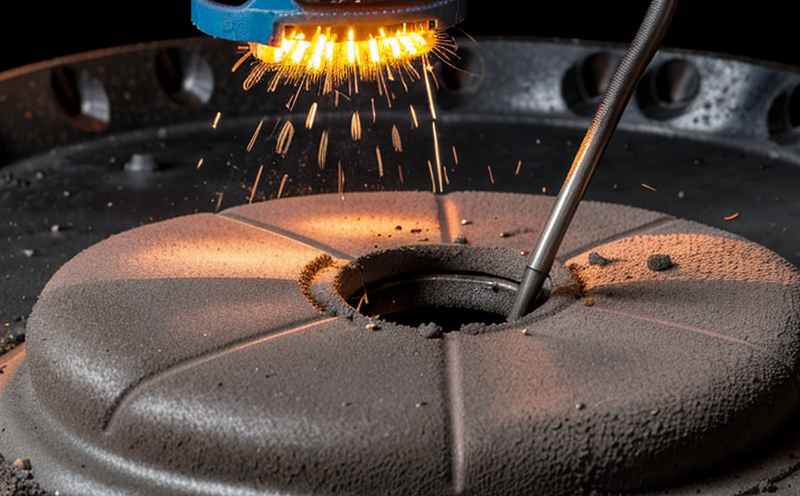Evaluating how well materials hold up under abrasive forces that can cause surface damage or degradation
Evaluating Materials Abrasion Resistance A Crucial Service for Businesses
In todays fast-paced manufacturing and industrial landscape, materials are constantly subjected to various forms of wear and tear. Among these, abrasive forces pose a significant threat to the integrity and longevity of materials used in production processes. Abrasion, the process of wearing away or breaking down a material through friction or rubbing action, can cause surface damage or degradation, compromising product quality and potentially leading to costly repairs or replacements.
Thats where Eurolab comes in our laboratory services provide comprehensive evaluations of materials resistance to abrasive forces. By understanding how well your materials hold up under these conditions, youll be better equipped to make informed decisions about material selection, production processes, and maintenance schedules. In this article, well delve into the importance of evaluating materials abrasion resistance and explore the numerous benefits that Eurolabs laboratory services can offer.
Why Abrasion Resistance Matters
Abrasion resistance is a critical property of materials that determines their ability to withstand wear and tear without suffering significant damage or degradation. In various industries, such as construction, manufacturing, and transportation, materials are exposed to abrasive forces on a daily basis. For instance
Wear-resistant coatings in industrial equipment can be damaged by abrasive particles in the air or water.
Road surfaces must endure constant wear from traffic and weather conditions.
Machine components, like gears and bearings, are subject to friction and abrasion during operation.
The consequences of inadequate abrasion resistance can be severe
Reduced product lifespan
Increased maintenance costs
Decreased performance
Safety risks due to compromised materials
Advantages of Evaluating Materials Abrasion Resistance
Eurolabs laboratory services offer a range of benefits for businesses seeking to optimize their material selection and production processes. Some key advantages include
Improved material selection By understanding the abrasion resistance of various materials, you can choose the most suitable options for your specific applications.
Enhanced product durability Evaluating materials abrasion resistance helps identify potential weak points, allowing you to implement targeted maintenance and repair strategies.
Increased efficiency By selecting materials with optimal abrasion resistance, you can reduce downtime, lower maintenance costs, and improve overall productivity.
Compliance with industry standards Our laboratory services ensure that your materials meet or exceed regulatory requirements, minimizing the risk of non-compliance.
Key Benefits
Customized testing protocols tailored to your specific material and application needs
Accurate and reliable results, providing a solid foundation for informed decision-making
Comprehensive reporting and analysis, including recommendations for improvement
Frequently Asked Questions (FAQs)
Q What types of materials can Eurolab test for abrasion resistance?
A Our laboratory services cover a wide range of materials, including metals, polymers, ceramics, and composites.
Q How do I prepare my samples for testing?
A We provide detailed guidelines on sample preparation to ensure accurate and reliable results.
Q What types of abrasive forces can be simulated in Eurolabs laboratory?
A Our facilities are equipped to simulate various forms of abrasion, including dry friction, wet erosion, and particle impact.
Q Can I request customized testing protocols or modifications to existing tests?
A Yes, we work closely with clients to develop tailored testing strategies that meet their specific needs.
Conclusion
Evaluating materials abrasion resistance is an essential service for businesses seeking to optimize production processes, reduce costs, and ensure compliance with industry standards. By partnering with Eurolab, youll gain access to comprehensive laboratory services, expert analysis, and actionable recommendations for improvement. Dont compromise your products or operations choose Eurolabs reliable and accurate evaluations to ensure the longevity and performance of your materials.
-
Testing the ability of materials to resist surface wear due to friction or rubbing
-
Simulating conditions where construction materials experience frequent contact with rough surfaces
-
Testing the durability of materials used in flooring, pavements, and high-traffic areas against abrasion
-
Ensuring that materials retain their appearance and function despite exposure to wear and tear
-
Verifying that construction materials, such as coatings and paints, remain intact after prolonged use
-
Simulating the effects of mechanical wear on materials such as metals, concrete, and plastics
-
Testing the effectiveness of protective coatings against abrasion, particularly in outdoor environments
-
Evaluating the resistance of materials used in the construction of roads, sidewalks, and parking areas
-
Testing for scratches, gouges, or erosion on materials exposed to abrasive particles or tools
-
Ensuring that construction materials used in industrial environments maintain their strength and integrity under abrasion
-
Testing how well materials resist damage from contact with other materials, such as machinery or tools
-
Ensuring that materials used for roofing, siding, and cladding can withstand frequent exposure to dust and dirt
-
Verifying that materials used in construction equipment can resist damage from abrasive substances like sand or grit
-
Simulating high-wear conditions in construction to assess the long-term performance of materials
-
Ensuring that materials used for flooring in commercial spaces can resist the effects of foot traffic and machinery
-
Testing the ability of materials to resist pitting or surface degradation under constant friction
-
Evaluating materials used for interior and exterior finishes for their resistance to wear and tear
-
Testing for the ability of materials to maintain structural integrity and appearance after heavy mechanical handling
-
Ensuring that materials used in industrial construction can withstand abrasive cleaning processes
-
Verifying the durability of construction materials used in mining, oil, or heavy machinery environments
-
Evaluating how abrasion resistance affects the longevity and maintenance needs of construction materials




